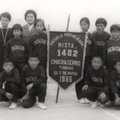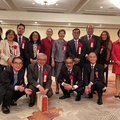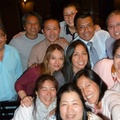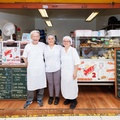El consultor de negocios, Nano Guerra García, estuvo en Japón, donde impartió charlas sobre emprendimiento a los peruanos inmigrantes.
¿Cómo resumiría su experiencia en Japón?
Yo tengo dos sentimientos. Uno, la reafirmación de mi admiración por Japón. La tuve desde chico. Me crié en la Residencial San Felipe y teníamos el Centro Cultural Peruano Japonés ahí. Recuerdo cuando el presidente Belaunde y el entonces príncipe Akihito sembraron los árboles. Yo veía una comunidad diferente, ordenada. Esto (el viaje a Japón) es una confirmación. O sea, llegar a Japón y ver un país donde la gente respeta al otro, un país que yo resumiría en la palabra “armonía”. Eso, combinado con otra admiración por los peruanos en Japón, que también es otra reafirmación: comprobar el espíritu emprendedor que tenemos los peruanos.

Consultor en negocios Nano Guerra García: “He encontrado una suerte de mercado de la nostalgia (en Japón). La mayoría de los que han hecho negocio ahí, han hecho negocio para venderles a peruanos”.
¿Los peruanos en Japón quieren regresar al Perú?
Yo diría que hay un buen porcentaje de gente que está pensando en venir, hay mucho interés sobre qué tipos de negocios tener. No todos. Otros están interesados en qué negocios pueden poner ahí. Algunos no fueron a las conferencias. Son los que aprovecharon el fin de semana largo para descansar o viajar, lo que demuestra que lo que quieren es, de repente, mantenerse en la condición en que están. Eso no les quita la condición de emprendedores. El que decide migrar, el que decide salir a enfrentar una nueva vida, es alguien que no es un conformista, es alguien que tiene ya esa semilla de buscar algo nuevo, que es lo que tuvieron los dekasegi.
¿Qué le preguntaban sobre el Perú?
Había una necesidad de ver cómo está el Perú, si es verdad tanta belleza, si estamos mejorando, si hay oportunidades. Luego la pregunta clásica: “Tengo un dinero ahorrado, ¿en qué negocio puedo entrar?”. Y ha habido otro tipo de conversaciones con los que ya tienen un negocio allá: “Nano, ¿qué más puedo hacer?”. He encontrado una suerte de mercado de la nostalgia. La mayoría de los que han hecho negocio ahí, han hecho negocio para venderles a peruanos. Entonces te llevo el Sublime, te pongo el pollo a la brasa. El mercado de la nostalgia, como la nostalgia, se acaba. Ya la segunda generación no extraña el arroz con leche porque no lo ha comido todos los días. Ellos han comido en Japón, y quieren más el ramen o las comidas de ahí. Por tanto, es un mercado que se va acabando. A estas personas hay que decirles que conquisten a los japoneses, que no es tan fácil, o que conquisten a los otros latinoamericanos. He encontrado a otros que sí han sabido hacer negocios con los japoneses, y esos me parecen los más interesantes.
¿Por ejemplo?
He visto tres casos. Uno de un peruano que llegó y empezó a trabajar directamente con japoneses. Lo que hizo fue “aislarse” de su comunidad. Aprendió japonés en textos portugueses porque no había muchos en español. Él tiene un negocio de asesoría. Dos, una mujer que trabaja en proporcionar a las empresas el equivalente a services. Ella sí conectándose con los latinos, pero es la intermediaria, la que puede lograr que los latinos consigan trabajo. Y tres, una señora que tiene un restaurante que se llama Miraflores, que sí ha sabido llevar a los japoneses a su restaurante. Ahora está sacando un segundo restaurante y tiene éxito en Tokio con la comida peruana.
Es contraproducente para los negocios que los peruanos se aíslen de la sociedad japonesa, ¿no?
Por supuesto. El mercado de la nostalgia funciona en un mundo de la nostalgia. El mundo de la nostalgia funciona cuando llegas a una comunidad que te acoge, y como siempre nos gusta nuestra zona cómoda, te quedas ahí. Yo me he sorprendido de (encontrar) dekasegi que hablan muy poco japonés. Es gente que está en un trabajo simple, repetitivo, y luego vuelve a su comunidad. Entonces es más difícil que haga negocios. Los que lo han hecho son los que han sabido romper con el círculo de la nostalgia y relacionarse con otros. ¿Eso es más duro? Sí pues, pero el éxito o la recompensa son más fuertes. Tienes que tener una autoestima muy fuerte. A veces el migrar, el trabajar de obrero, de manera subordinada, te golpea la autoestima. Una de las condiciones claves para emprender es tener la autoestima muy alta. Ahí hay algo que trabajar. Si yo pudiese desarrollar un trabajo con los dekasegi, diría trabajemos mucho la autoestima.
¿Qué cosas del Estado japonés podríamos aplicar en el Perú?
Japón tiene un Estado que interviene bastante, pero es eficiente. Tú recibes un Estado que puede meterse en varias cosas, puede pedirte ochenta mil licencias, pero cumple. Tiene una casta de funcionarios cumplidos, honestos. Me ha gustado, por ejemplo, cómo el policía está en el barrio. El policía, al vivir en el barrio, es controlado por este, es un miembro más de la comunidad. El Estado japonés está pensando en cómo evitar los posibles impactos de los sismos. Un terremoto en Tokio haría colapsar la economía japonesa, entonces es un Estado que dice “vamos a comenzar a irnos (a otras partes de Japón), a dispersar el riesgo”. Es un Estado que cuando tú entras a la carretera te da un ticket y cuando tú sales te cobra lo que usaste, te cobra lo justo.
¿Qué más le dejó su viaje a Japón?
Yo no era de ir a muchos sitios japoneses acá (en Lima), pero regresé y le dije mi hija, que es fanática (de la comida japonesa), “ahora vamos a poder ir juntos”, porque he pasado a ser un admirador también de la comida. Me gusta, yo siento que es una comida limpia y que digiero rápido. Yo le doy mucha importancia a la comida sana.
* Este artículo se publica gracias al convenio entre la Asociación Peruano Japonesa (APJ) y el Proyecto Discover Nikkei. Artículo publicado originalmente en la revista Kaikan Nº 68, junio 2012 y adaptado para Discover Nikkei.
© 2012 Asociación Peruano Japonesa; © 2012 Fotos: Asociación Peruano Japonesa / Álvaro Uematsu









